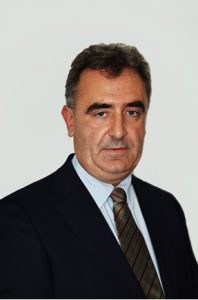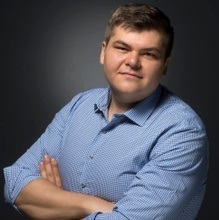Role of IT and IoT in responding to epidemic/pandemic related challenges
The coronavirus COVID-19 pandemic exposed many challenges that global society needs to respond to in order to save lives, health, and economy. It turned out that IT played a fundamental role in mitigating risks and consequences, and providing alternative ways of performing fundamental tasks in our lives. Within this panel we are trying to discuss the different aspects of using IT and IoT to respond to these challenges, ways to improve the response, and the risks that could arise in future epidemic and pandemic events.
Moderator:

Prof. Mladen Veinović
Singidunum University, Serbia
Prof. Mladen Veinovic, PhD has obtained his B.Sc., M.Sc. and Ph.D. degrees in 1986, 1990 and 1996 respectively, from the Faculty of Electrical Engineering, University of Belgrade, Serbia. As of 1987, Prof. M. Veinovic was employed at the Institute of Applied Mathematics and Electronics, Belgrade, first at the position as a researcher and later as the head of Department for the development of special purpose devices in telecommunication systems. In 2005 Prof. M. Veinovic started working at Singidunum University in the Faculty of Informatics and Computing. The research field of Prof. M. Veinovic is currently engaged in the data security, computer networks, databases, digital signal processing. He is the author of many scientific articles in the field of security in communication systems.
Speakers:
 Zona Kostic
Zona Kostic
Harvard University, USA
Zona Kostic is a research, teaching, and innovation fellow at Harvard University. Before coming to the US, Kostic held an assistant professor position at the Faculty of Informatics and Computing in Belgrade, Serbia. In 2016, Kostic joined the Faculty of Arts and Sciences at Harvard University for a more empirical focus on data science, and in 2017, she obtained a postdoc research position at the Visual Computing Group at Harvard SEAS, working on visual analytics projects. Kostic’s recent advances focus on combining information visualization and machine learning into intelligent Web systems, intensively collaborating with researchers inside and outside of the US. She has been a peer reviewer for numerous scientific journals as well as a committee member for most prestigious conferences. Kostic published six books and many research works at high impact journals.
 Ivan Chorbev
Ivan Chorbev
University Ss. Cyril and Methodius, North Macedonia
Ivan Chorbev earned his bachelor and master degrees at the Faculty of Electrical Engineering in Skopje in 2004 and 2006. He completed his PhD studies at the Faculty of Electrical Engineering and Information Technologies in Skopje in 2009. During his studies he has been continually awarded for excellent performance. As the best student of his generation he has been awarded by the Faculty, University Ss. Cyril and Methodius and other organizations and foundations, including the Organization of Engineers of Macedonia that awarded him the “Golden engineering ring”. His teaching commitments included lectures in Structured Programming, Object-oriented programming, Programming Methodologies, Web Design, Computer Graphics, Computer Animation etc. The fields of his research interests include combinatorial optimization, heuristic algorithms, constraint programming, web development technologies, software testing, application of computer science in medicine and telemedicine, medical expert systems, knowledge extraction, machine learning. He is an author of one university textbook, and a reviewer of another one. As an IT consultant he has been involved in analysis and development of several Enterprise Resource Planning (ERP) systems, University Information Systems, Web Content Management Systems, Document Management Systems, Online payment systems, Electronic time and attendance systems, banking applications, oil industry software. He has participated as an IT consultant in projects financed by the European Union (FP6, FP7, TEMPUS), non-government organizations (NDI).
 Igor Kotsiuba
Igor Kotsiuba
National Academy of Sciences of Ukraine
Dr. Igor Kotsiuba has served for more than a decade in industry and academia and has completed numerous transnational projects with leading players in Cybersecurity and Industrial IoT. Dr. Kotsiuba is a counsellor in government and industry and founder at cybersecurity agency iSolutions and established a digital forensics lab in Ukraine to build capacity and restore the rule of law in cyberspace. Igor is an evangelist of an inclusive approach to delivering full-stack cybersecurity managed services from initial compromise assessments to digital forensics evidence verifications. He has been advising Ukrainian Businesses and Governmental Institutions on Cybersecurity issues, In the year 2018 Igor Kotsiuba was elected as a Head of Cybersecurity Work Group at the American Chamber of Commerce Ukraine. Igor is an Of Counsel at Asters and supports their team in Brussels on ongoing Joint Activities in European Parliament.
Dr. Kotsiuba is eminently qualified in the field of cybersecurity; he is a participant in EU Horizon Research and Innovation and Key Expert in Regional EU projects, Ph.D. in Information Technology and he is a member of IEEE. Igor regularly invited as keynote speaker, guest lecturer in European universities as well as a Program and Editorial Committees Member and Editorial of reputable Cybersecurity Journals and conferences. In the year 2019 was elected to the Management Committee of European Commission’s COST Action “Artificial intelligence for Digital Forensics”. Participates in OASIS OPENC2, Technical Committee on Cybersecurity of Energy Grids. For Ukrainian capacity in cybersecurity, was funded and managed EU Projects ALIOT(Cybersecurity of IoT Protocols), SPEAR (Cybersecurity of Smart Energy Grids), RESPONSE(positive smart cities) launched and lead Digital Forensics Science Lab at PIMEE NAS of Ukraine under which delivers guest lectures and trainings in Norway, the UK, Germany, The Netherlands.
 Nuno M. Garcia
Nuno M. Garcia
Universidade da Beira Interior, Portugal
Nuno M. Garcia received the B.Sc. degree (Hons.) in mathematics/informatics, and the Ph.D. degree in computer science and engineering from the Universidade da Beira Interior (UBI), Covilhã, Portugal, in 2004 and 2008, respectively. He was the Founder and also the Coordinator of the Assisted Living Computing and Telecommunications Laboratory, a research group within the Instituto de Telecomunicações, UBI. He was also the Co-Founder and is currently the Chair of the Executive Council of the BSAFE LAB–Law enforcement, Justice and Public Safety Research and Technology Transfer Laboratory, a multidisciplinary research laboratory in UBI. He is the Coordinator of the Cisco Academy, UBI. His main interests include next-generation networks, algorithms for bio-signal processing, distributed and cooperative protocols, and the battle for a free and open Internet. He is a member of the ISOC, and the Non-Commercial Users Constituency, a group within GNSO in ICANN. He was the Chair of the COST Action IC1303 AAPELE–Architectures, Algorithms and Platforms for Enhanced Living Environments, Brussels, Belgium.

